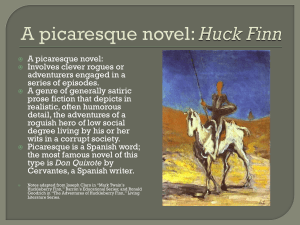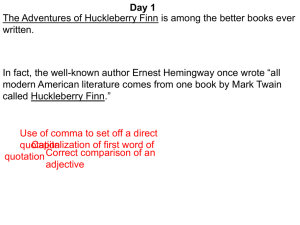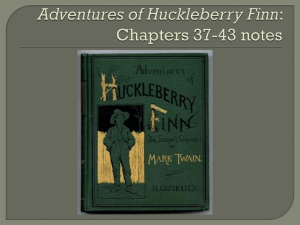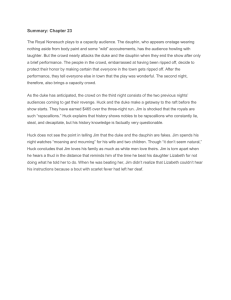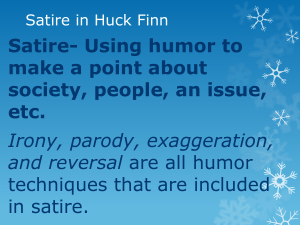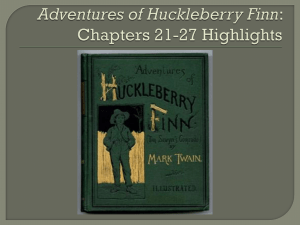Themes & Questions
advertisement
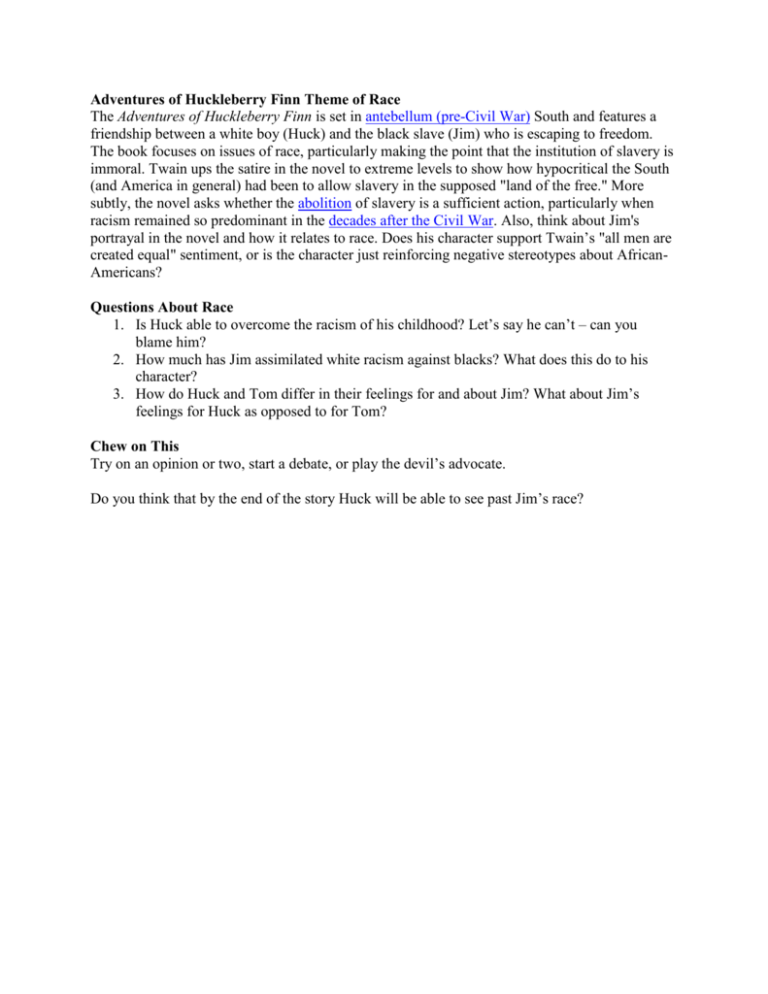
Adventures of Huckleberry Finn Theme of Race The Adventures of Huckleberry Finn is set in antebellum (pre-Civil War) South and features a friendship between a white boy (Huck) and the black slave (Jim) who is escaping to freedom. The book focuses on issues of race, particularly making the point that the institution of slavery is immoral. Twain ups the satire in the novel to extreme levels to show how hypocritical the South (and America in general) had been to allow slavery in the supposed "land of the free." More subtly, the novel asks whether the abolition of slavery is a sufficient action, particularly when racism remained so predominant in the decades after the Civil War. Also, think about Jim's portrayal in the novel and how it relates to race. Does his character support Twain’s "all men are created equal" sentiment, or is the character just reinforcing negative stereotypes about AfricanAmericans? Questions About Race 1. Is Huck able to overcome the racism of his childhood? Let’s say he can’t – can you blame him? 2. How much has Jim assimilated white racism against blacks? What does this do to his character? 3. How do Huck and Tom differ in their feelings for and about Jim? What about Jim’s feelings for Huck as opposed to for Tom? Chew on This Try on an opinion or two, start a debate, or play the devil’s advocate. Do you think that by the end of the story Huck will be able to see past Jim’s race? Adventures of Huckleberry Finn Theme of Morality and Ethics Thirteen-year-old Huck Finn’s narration in this novel focuses largely on his internal moral struggles. Forced to reconcile his personal feelings of friendship for an escaped slave with what society has told him is "right," Huck learns through the course of the story to trust his moral instincts. Despite his actions, however, the question remains at the end of novel as to whether Huck is truly able to overcome the pervading ethos of the pre-Civil War South. You could argue either way. Huck was amazingly strong-willed and in touch with his own personal sense of morality to turn away from society’s pressures and the law’s threats. But the end of the novel is somewhat ambiguous. To complicate matters, throughout the story Huck does tend to think one thing and then turn right around and believe another. Questions About Morality and Ethics 1. Huck is not the only one who has moral crises every now and then. Regarding these other characters who think about morality, do they change as a result? Does Huck? How so? 2. Does guilt help our hero (that would be Huck) or hinder him? 3. What’s up with Tom "having principle?" Is "principle" just the same thing as "morality," only with a few more consonants in the word? Or is it something different? Chew on This—Do You Agree? Try on an opinion or two, start a debate, or play the devil’s advocate. While at first Huck struggles to reconcile several different systems of morality presented to him, he comes to define his own unique set of beliefs that are separate from the rest of society. While many characters struggle through moral dilemmas, Jim is the only truly moral character in the story. Adventures of Huckleberry Finn Theme of Rules and Order The Adventures of Huckleberry Finn presents a slew of conflicting rules. Narrator Huck Finn struggles in choosing between religious rules, his own moral instincts, the country's laws, and the relativist justifications of the conmen called the duke and king. From rules of honor and principle amidst feuding families to childlike views of the world as something fantastical, Huck Finn explores the contradictions between these different systems and the effect such conflict can have on a young boy. When thinking about the big decisions Huck is faced with, we can’t help but think of one of those posters hanging on middle school wall: "What’s popular is not always right, what’s right is not always popular." We think Huck would agree with that. We could also edit that maxim to say that the law isn’t always right, and Tom Sawyer isn’t always right, and preachers aren’t always right... but Huck has to figure out what is the right thing to do. Questions About Rules and Order 1. Huck is presented with different systems of morality from all these different people. What are these systems, exactly, and how are they different? 2. There are a few instances of mobs and lynching tossed in to the book. To what degree do these mobs replace the real laws of state? Which norms end up being more powerful? You should check out Sherburn’s speech. He tends to touch on mobs, and by touch we meet harp. 3. What system of rules is Jim operating under? Chew on This Try on an opinion or two, start a debate, or play the devil’s advocate. Although Tom’s system of acceptable behavior is childish in nature, its foolishness is matched by the essentially absurd nature of slavery and southern morality. Despite much debate and consideration, Huck is ultimately unable to define for himself a new system of behavior separate from that of the South. Adventures of Huckleberry Finn Theme of Lies and Deceit Deception takes many different forms in the Adventures of Huckleberry Finn. Sometimes it is used for benevolent purposes (to save a man’s life, or shield someone from pain), sometimes for harmless fun (to play pranks), and sometimes also for self-serving manipulation (the duke and the king). Narrator Huck Finn seems to enjoy lying at any and all opportunities, but he’s thirteen and is still just a child. This novel seems to draw a thick line between harmless lies and morally corrupt ones. For instance, someone with hurtful or selfish intentions will be caught and punished for their wrongdoing; individuals with benevolent aims never cause any real harm. Questions About Lies and Deceit 1. Why does Huck enjoy lying so much? 2. Ever notice how lies that start really simple end up really complicated? Why is that? Does Huck seem concerned about this at all? 3. What’s the difference between the way that Huck deceives and the way that the duke and king do? Can you really draw lines in the sand between "good" lying and "bad" lying in this novel? Chew on This Try on an opinion or two, start a debate, or play the devil’s advocate. While Huck at first enjoys making things up, he comes to recognize, through observing the duke and king, the negative aspects of deceit. Huck’s stories involve elaborate descriptions of parents and siblings. They display his longing for a real family. Adventures of Huckleberry Finn Theme of Religion Religion seems to be a constant target for criticism in the Adventures of Huckleberry Finn. Those who are religious are often painted as overzealous, and many of them are manipulated because of their faith. It seems that Twain places organized religion in opposition to his central anti-racism theme; Huck feels like he has to renounce religion in order to help Jim escape to freedom. Twain might have painted religion in such a negative way for several reasons: 1) his own personal views on religion; 2) the common belief in the antebellum Southwas that God had made black people naturally inferior, and that slavery was OK; and 3) the church was an easy target for satire. We think, most likely, it was some sort of combination of the three. Questions About Religion 1. Huck pretty much rejects Miss Watson’s religion, right? So what does he put in its place? 2. We said Huck "pretty much rejects Miss Watson’s religion." But maybe we’re wrong. After all, he still talks about going to hell all the time and worries about saving his soul and praying. So what is he rejecting, then, and to what is he choosing to hold on? 3. Huck says, "You can’t pray a lie." What is he getting at there? What would praying a lie entail? Chew on This Try on an opinion or two, start a debate, or play the devil’s advocate. Although it prompts several of his internal moral debates, religion, with its strict policies, ultimately hinders Huck in his developing friendship with Jim. Adventures of Huckleberry Finn Theme of Friendship The developing friendship between Huck and a Jim is the main driving force of this novel. It is this friendship that makes Huck’s decision of whether to help Jim escape slavery so difficult. Huck's ultimate choice pits him against everything had previously known to be right. Huck makes several comments throughout the book that let us know how seriously he takes his friendships. He values loyalty most highly, and that leads him to stick with Jim (who proves his loyalty to Huck several times) to the end. Throughout the course of the story, many friendships are tested again and again, but whether or not the ideal of friendship prevails at the end of the day is subject to debate. Questions About Friendship 1. There are lot of different kinds of camaraderie going on here, and a lot of different friendships. Huck, for instance, is close both to Jim and to Tom. Are those different kinds of friendships, and if yes, how so? 2. Which characters recognize the friendship between Huck and Jim, and which do not? How can you tell? For those who do recognize the friendship, do they see it as somehow less genuine than a friendship between Huck and Tom? 3. Does the duke-king relationship indicate that there is such a thing as a bad friendship? By that we mean a friendship that seems to make both people worse off than before? Chew on This Try on an opinion or two, start a debate, or play the devil’s advocate. Because they are in constant close proximity on the raft, the self-serving friendship of the duke and the king acts as a foil to the selfless friendship between Huck and Jim. Although they grow closer as the story progresses, Huck and Jim’s friendship is never made complete because it is still affected by Jim’s race even at the end of the novel. Adventures of Huckleberry Finn Theme of Youth Huck Finn’s youthful naiveté is part of the charm of the Adventures of Huckleberry Finn. Because of his young age, he is able to approach conflict with an innocence and curiosity that an older protagonist might lack. Too young to be fully indoctrinated with the values of antebellum (pre-Civil War) South, Huck gets to examine issues in light of his own still-evolving moral compass. Tom Sawyer’s runaway imagination adds another layer of adventurousness to the plot, and Huck’s contentment with the simple things in life remind us we’re not dealing with somebody who’s got a ton of personal baggage. Lastly, the playful tone of Huck’s narration strikes an interesting balance with the weightier topics of the novel, such as slavery, morality, and racism. Questions About Youth 1. Huck is a young guy, but he has these earth-shattering realizations about morality, government, religion, law, and family. Why did Twain write it that way? Could an older person have had the realizations Huck did? 2. Tom seems to bring out the playful, childish side in Huck. Is this the biggest difference in them? Why did Twain throw Tom back in the mix at the end? 3. Does the novel portray Jim and Huck as equals? Remember that one is a grown man the other a young boy. In what ways are Jim and Huck on the same level, and in what ways are they not? Chew on This Try on an opinion or two, start a debate, or play the devil’s advocate. Huck’s friendship with Jim is made possible only by the naiveté and malleability of Huck’s youth. Adventures of Huckleberry Finn Theme of Foolishness and Folly For the most part, characters in the Adventures of Huckleberry Finn are made fools by other characters. Pranks, cons, tricks, and deceptions seem to be everyone’s stock and trade in this novel, which means a healthy supply of gullible nitwits is in demand. And there seems to be no shortage. As one character succinctly remarks (shortly before being made into an utter fool himself), the group of fools in any town always comprises the majority. True – at least as far as the Adventures of Huckleberry Finn is concerned. Questions About Foolishness and Folly 1. Who is the most foolish character in this story? 2. What’s going on with this mob business? We only ask because we see this recurring theme where there’s a mob of ignorant people and then one guy saying something really smart that everyone ignores. If the mob is so dumb, and this one guy is so smart, why does no one recognize that? 3. What does it mean to be foolish in this text? What if someone isn’t foolish so much as ignorant? Chew on This Try on an opinion or two, start a debate, or play the devil’s advocate. The foolishness of "the mob" in Adventures of Huckleberry Finn serves as a parallel to the folly of the whole of Southern culture for its beliefs on slavery. "Foolishness" with regards to intellect is inversely proportional to wisdom and morality in the characters of Adventures of Huckleberry Finn. The smarter the man, the more immoral. Adventures of Huckleberry Finn Theme of Man and the Natural World One of Huck Finn’s struggles in this book is whether he prefers the world of civilization to living in the woods. Often it seems he is a wild, unkempt thirteen-year-old boy who would rather spend his day catching snakes than washing up for supper. He declares several times that he’s happiest when he’s alone with nature (or alone with Jim and nature). However, it is also clear that Huck craves the structure and caring of a family household. He strongly admires some aspects of the cultural world, and seems to respect (and sometimes envy) others’ choice to follow rules and social norms. The tension between Huck’s desire for a free, unencumbered life and the pull towards family structure and cultural refinement is one of Huck’s central battles. Questions About Man and the Natural World 1. Huck is Mr. Indecisive when it comes to, well, deciding things, namely whether he would prefer to eat with a napkin on his lap or hunt for fish with his bare hands. What does Huck really want? 2. Huck spurns religion (sort of), but holds his reverence for the natural world. Look at those scenes where he describes the stars or the river and the lightning. Is this a kind of religion in itself? If not, what does the wilderness mean to Huck? Chew on This Try on an opinion or two, start a debate, or play the devil’s advocate. Although he enjoys his time in the outdoors, at heart Huck prefers the civilized world of family. Although he doesn’t mind the civilized world when he is there, Huck really belongs outdoors on the river. Adventures of Huckleberry Finn Theme of The Supernatural Belief in the supernatural and superstition in general are the marks of multiple characters in the Adventures of Huckleberry Finn. It’s their mutual belief in certain superstitions that originally draws Huck and Jim together. Neither has a strong religious faith, and their belief in certain superstitions help both Jim and Huck explain things that they cannot otherwise explain. It is possible that the novel parodies religion by comparing it to mere superstition, since some characters take advantage of both belief systems to manipulate and deceive. Often, superstitions are used as attempts to explain why bad things happen. When a character gets rewarded, or when something good happens, most would like to take credit for that positive outcome. But when someone is punished, or something terrible happens...well, it’s a lot more comforting to blame that on plain old rotten luck. Questions About The Supernatural 1. Does Twain make religion appear similar to superstition? 2. Who are the main proponents of superstition in the text? What does it say about them? Chew on This Try on an opinion or two, start a debate, or play the devil’s advocate. Superstition, like religion, is detrimental to those who follow it, mostly because manipulative characters are able use it against them. Adventures of Huckleberry Finn Theme of Family During his adventures on the Mississippi River Huck Finn encounters one family after another. Having left an abusive father behind, Huck appears to be trying out various familial situations as he travels. It seems like he’s pretty keen on getting a family of his own because most of Huck’s deceptions involve him making up a fictitious "family" of his own that fits in with the story. He develops many pseudo-family relationships during his travels. Interestingly, the strongest familylike bond he creates is with his own friends, and particularly with Jim and Tom. It remains unclear whether or not Huck realizes and accepts this fact, but he definitely recognizes the unmatchable strength of the bonds he and his friends share. As a semi-orphan, Huck replaces his missing family with his friends. Questions About Family 1. Huck chills out with a lot of different families along the river. What are differences between these families, and what does each one do for Huck’s character? 2. We spend all this time talking about the families Huck gets involved with along the river – but what about the one he’s already got on the raft with Jim? Is that like a family? If so, are they more like brothers, or is there a father-son dynamic going on? 3. Huck’s real father is an abusive alcoholic. Does that mean he is no longer a father to Huck? Does he lose parental privileges because of his actions? Chew on This Try on an opinion or two, start a debate, or play the devil’s advocate. Huck’s journey along the river and the tales he tells about family are all part of his search for the perfect home. But he finds the entire familial system so flawed that he gives up and heads west at the end of the novel. Huck’s search for the perfect family ends in his realization that he already has a perfect family in his friends. Adventures of Huckleberry Finn Theme of Drugs and Alcohol Alcohol use in Huck Finn is usually portrayed as compulsive and excessive, and it’s always a harmful activity. Huck’s father is an abusive alcoholic, and therefore his son can see nothing positive about the substance in any given situation. Every time a man touches a drop of alcohol in the novel, needless harm comes to him and/or innocent bystanders. Besides Pap’s drunken abuse of Huck, the king sells Jim back into slavery in order to get cash for a whiskey binge. Even a harmless town alcoholic (Boggs from Chapter 21) gets killed because he directs one of his drunken rants at the wrong guy. Questions About Drugs and Alcohol 1. How does having an alcoholic father affect Huck’s relationship with others (like other father figures, for example)? 2. There’s a lot of boozin’ going on in this story, which is also concerned with larger issues like race and morality and friendship and loyalty. What’s the connection here? Chew on This Try on an opinion or two, start a debate, or play the devil’s advocate. Alcohol serves to satirize, denigrate, and condemn Southern culture in Adventures of Huckleberry Finn.

